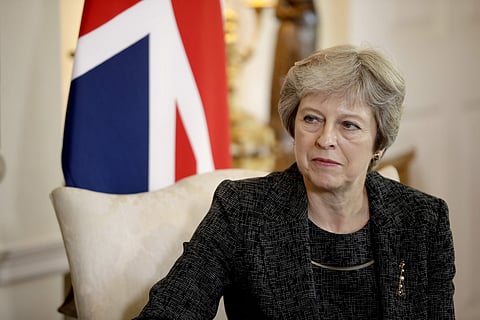

LONDON: British Prime Minister Theresa May was reeling on Tuesday from yet another Parliament defeat when MPs backed an amendment to seize control of Brexit by 329 to 302 votes.
In a House of Commons vote on Monday night, many of her own party MPs, including three ministers, backed the motion which called for a series of "indicative votes" to be held to find alternatives to May's controversial European Union (EU) divorce bill, which has been rejected twice before by Parliament.
May has said she remains "sceptical" about the process as it was not guaranteed to produce a majority for any one course of action and refused to commit the government to abiding by any particular result at the end of Wednesday's votes.
"The votes could lead to an outcome that is un-negotiable with the EU," she told MPs.
As part of the latest Commons high-drama, MPs voted in favour of Conservative backbencher Oliver Letwin's cross-party amendment to allow them to put forward motions relating to Brexit.
It will give them a chance to weigh up a number of options on Wednesday likely to include a so-called softer Brexit with closer alignment with the EU, a Customs Union with the EU, a second referendum on the decision leave the economic bloc and possibly even an option to revoke Article 50 and reverse Brexit altogether designed to test which formula could command a Commons majority.
Three ministers foreign affairs minister Alistair Burt, health minister Steve Brine, and business minister Richard Harrington who went against the Cabinet's collective responsibility principle to vote for the amendment, resigned from government.
A total of 29 Tory MPs rebelled to vote for the motion, a scenario becoming all too familiar for May as her party members continue to defy government whips on parliamentary votes over Brexit.
It has inevitably intensified calls for her to step down in the face of her diminishing authority, with talk of a snap General Election also doing the rounds.
EU leaders have offered Britain a Brexit delay until May 22, if May's deal is passed this week overcoming the Irish backstop hurdle.
However, without that Parliament backing, she must return to Brussels before April 12 and set out an alternative plan.
The default legal option of Britain crashing out of the 28-member economic bloc without a deal in place has now effectively shifted from the initial March 29 deadline to April 12.
May's backers are urging all sides of the Brexit divide to unite behind the British prime minister's withdrawal agreement as the best possible option.
"The idea of having a no deal the Commons is absolutely clear it won't allow and will legislate against it if necessary.
That means that the options are narrowing," said UK health secretary Matt Hancock.
"So therefore those who want us to leave and who have previously been voting against the deal because they would prefer a no-deal. The best way now to deliver on Brexit is to vote for the Prime Minister's deal," he said.
But the Opposition Labour Party said MPs have to take responsibility for the Brexit process because the government had failed to do its job.
"If the government isn't going to do its job then Parliament is going to have to take responsibility, and that is what we are doing on Wednesday," said Labour MP Hilary Benn, chair of the Commons' Exiting the European Union Committee.
Parliament is also set to formally pass a law this week postponing the Brexit date from March 29, something already changed in international law.
Now all eyes will be on the series of votes planned for Wednesday even though May has refused to commit to backing any one that receives a majority backing.
How MPs take the process forward after the indicative votes is expected to set another parliamentary precedent.
Meanwhile, May has said that she had not given up hope of bringing back her divorce bill for a third "meaningful vote" this week, which could take place on Thursday.
The main stumbling block to that remains the Irish backstop clause, which Brexiteers fear could keep the UK tied to EU laws even after Brexit.